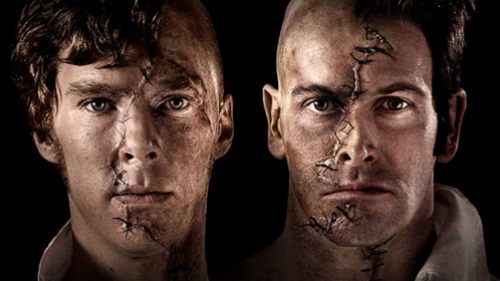THE IMITATION GAME Movie Review: Reassuring The Normals With Oscar Bait
Alan Turing killed himself by eating a cyanide-laced apple a year after the British court system had him chemically castrated for being a homosexual.
I lead with this fact because The Imitation Game buries it. Turing’s suicide is mentioned in an onscreen bit of text that you could miss if you sneezed. It treats the method of suicide as an easter egg, throwing in references to both cyanide and apples in the main body of the movie and then never following up on them (even in that onscreen text). It is, frankly, shameful, and is the final nail in the coffin of a movie that is essentially a dumb movie about very smart people.
The film’s problems extend beyond the way it attempts to give this tragic story a basically happy ending. Its structure is so baffling that I wonder if it’s intended as a puzzle that only supergenius Alan Turing himself could solve. The film opens with what appears to be a framing device - Turing in an interrogation room, telling some (us, really) to pay close attention, as he will explain this once and once only, and will allow no interruptions. Every now and again Turing jumps back in as a voice over, smoothing over chronological jumps (it flashes back to his childhood as well as spanning the entirety of World War II) and explaining the progress of the war, cementing the idea that the film is all his retelling of these events… except that the movie keeps jumping to the criminal investigation that got Turing into this interrogation room and then has the movie catch up to the framing device about three quarters of the way through and just keep chugging along in its fractured chronology. It’s nonsensical.
Which, whatever, right? If it works it works. Martin Scorsese doesn’t care about continuity! If this messy structure had a point, I might agree, but The Imitation Game is otherwise a profoundly middling movie, a film whose run-of-the-mill qualities are antithetical to its spoken themes, which are about embracing the odd ducks and weirdos for they’re the ones who do the truly special things in the world.
Films about outcasts do one of two things - either they unsettle us, making us aware of the injustices we often unthinkingly perpetrate against those who are different from us, or they reassure us, telling us that all the mistreatment we experience comes from those who fail to see our special uniqueness. The Imitation Game attempts to be that second kind of a movie, but it’s a film made by, and made for, the unremarkable, and as such it’s just a way of making the oppressors feel better about themselves. By removing Turing’s suicide the film attempts to blunt the true message of Turing’s life: no matter what you do for them, if you are different enough, the normals will destroy you. But this is a movie by and for the normals, so that message is unacceptable (although the movie uses it as its framing device - a detective, a codebreaker of his own sort but far removed from genius, brings down Turing because he finds something off about the man. The detective is, in a world where the framing device WORKS, the stand-in for the audience) and Turing’s life is twisted into a bittersweet triumph that allows everybody watching to feel better about themselves.
Besides being an offensive disservice to the sadly not singular tragedy of Alan Turing, how is The Imitation Game? It’s got plenty of good performances from reliable actors who infuse many obvious, unwitty moments with charm. The script, by Graham Moore (who wrote an episode of 10 Things I Hate About You and the short Pirates vs Ninjas), is filled with scenes where Turing - in today’s terms neuro-atypical, but in his time an ‘irascible genius’ - reacts literally to things or is comedically brusque or is sadly excluded, and the actors make these moments work better than they should. There are a couple of cutaways to Mark Strong’s MI6 liaison having ‘comical’ reactions to things Turing says or does that should be death, but Strong is too good to allow that.
Keira Knightley plays Joan Clarke, the sole woman on Turing’s team and, for much of the film’s runtime, his seeming love interest. The movie makes Turing’s homosexuality a reveal (and I apologize to any who think this is a spoiler, but I simply cannot believe the sexual identity of one of the 20th century’s most important people who died because of his homosexuality should be treated as a twist), but there’s such a lack of chemistry between Knightley and Turing that you have to see it coming. Knightley is good, and as with The Theory of Everything I spent a lot of time wondering how much better this film would have been if the filmmakers had chosen to tell the woman’s story - what was it like being brilliant but unable to show that brilliance because of enforced gender roles? - and I think Knightley is good enough to have carried that movie.
But it’s up to Benedict Cumberbatch to carry this movie, and when he gets his inevitable Oscar nomination it’ll be hard to grumble. Yes, playing a neuro-atypical closeted genius who has a couple of emotional scenes is a true Oscar baiting move, but he’s good in the role. And just because Turing’s life is the kind of life Oscar likes doesn’t make it gauche to portray it - or win for it.
Cumberbatch undercuts Turing’s social inadequacies with an innocent sweetness. I sometimes wondered if he went too far in that direction - he’s so often naive that when other characters react to him like he’s a robot I recoiled. Are they missing the sensitivity I can see plainly? But I get why Cumberbatch leans more on the sweetness - he’s not trying to do Sherlock Holmes again, and his Turing is definitely a very different character from his take on Doyle’s detective.
It’s a strong performance, one that only occasionally slips into cliched autistic mannerisms. No one working today can get across the feeling of cold logic like the serpentine Cumberbatch, and there’s a sequence where he must make hard, logical choices about who lives and who dies in World War II that is extraordinary (and should kind of be its own play). Cumberbatch is giving a performance that far exceeds the film around him; after all, this is a movie where a breakfast discussion about those hard, logical choices about which German attacks to stop and which to allow plays out against a backdrop of wounded soldiers being carried into a hospital. Layer that shit on, Morten Tyldum.
Tyldum is the director, and his weak hand here is a surprise after the joy of his blackly wicked Headhunters in 2011. Where is that subversion here? Where is that darkness? Where is that wit? The Imitation Game is nicely made, and it looks good, but I was surprised to learn the same man had directed both these films. It’s not that I expected The Imitation Game to have the same dog-killing nastiness of Headhunters, but I hoped it might have the same energy and the same skewed view of the world. The man who made that movie was the right choice to tell a story about how the unusual is ground down by the normals - but I guess he got ground down along the way.
The story of Alan Turing has been coming to the screen for years now; it’s such an obviously cinematic tragedy, and it’s an excellent way to shine a light on some of the late 20th century’s hidden outrages. I wish this movie had engaged that side of the story, but maybe some day someone will have the courage to honor the tragedy of Alan Turing’s last days.
I saw The Imitation Game at the Sloan Summit, a three day event that brings together scientists and storytellers to cross-pollinate ideas about how to better explain and present science to audiences. It's an exciting event hosted by the Alfred P. Sloan Foundation and Film Independent. For more about The Sloan Summit, click here.



